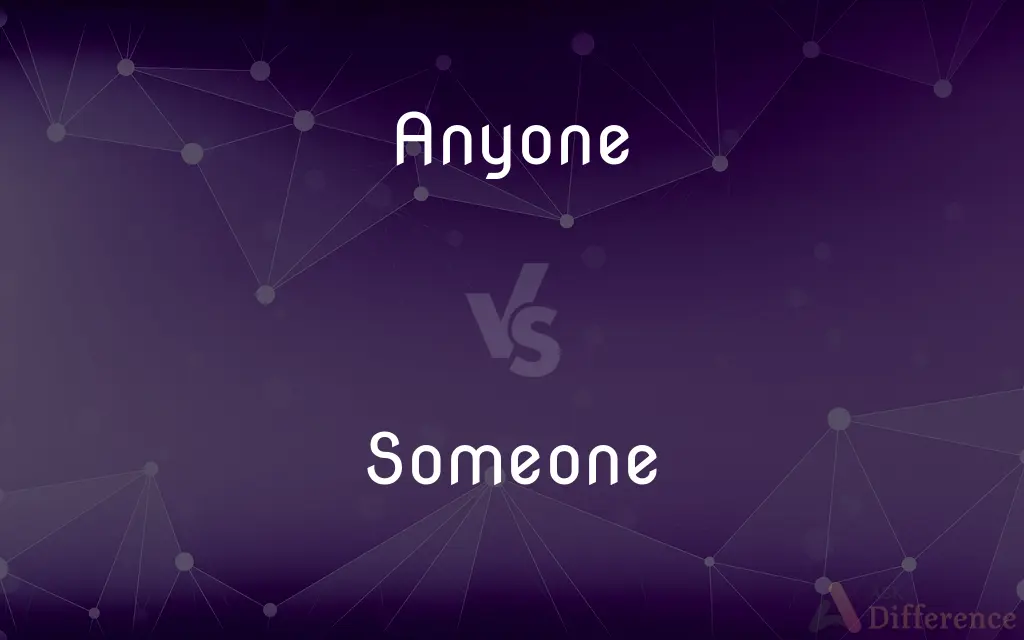Anyone vs. Someone — What's the Difference?
Edited by Tayyaba Rehman — By Maham Liaqat — Updated on March 13, 2024
Anyone refers to any person without restriction, emphasizing the lack of limitation in choice. Someone points to a specific, albeit unidentified, individual, highlighting a degree of selection.

Difference Between Anyone and Someone
Table of Contents
ADVERTISEMENT
Key Differences
Anyone is used when referring to any person without restrictions, suitable for open or general contexts. It implies no limitation on who can be involved. Someone, on the other hand, is used when the reference is to an unspecified individual within a more limited or defined context. It implies a certain degree of selection or specificity without identifying the person.
For example, "Anyone can join the club," suggests that there are no prerequisites for membership. "Someone left their umbrella," indicates that the speaker has a particular individual in mind, even though their identity is not specified.
The use of anyone is common in questions and negative statements where the identity of the person is not known or not important. Someone is often used in positive statements and tends to be more personal or specific than anyone.
Comparison Chart
Definition
Any person, without limitation
An unspecified individual within a limited context
Usage
General, open contexts
More specific, defined contexts
ADVERTISEMENT
Connotation
Impersonal, broad
More personal, specific
Example Sentences
"Can anyone answer this?"
"Can someone help me here?"
Negative Statements
Commonly used
Less common
Compare with Definitions
Anyone
In questions to mean any person at all.
Does anyone have the time?
Someone
An unspecified person within a certain context.
Someone left their phone on the table.
Anyone
Used to refer to people in general.
Anyone would be upset in this situation.
Someone
Used to indicate a particular person when their identity is unknown or irrelevant.
There's someone at the door.
Anyone
Any person without restrictions.
Anyone can learn to cook with the right resources.
Someone
In positive statements to refer to an individual.
Someone needs to take responsibility for this.
Anyone
In negative statements to mean no person.
Anyone could see that wasn't a good idea.
Someone
To imply a degree of specificity or selection.
I need someone who understands the project well.
Anyone
To emphasize a wide or unlimited selection.
The contest is open to anyone with a creative idea.
Someone
To suggest a personal or more intimate context.
I just need someone to talk to.
Anyone
Any person; anybody.
Almost anyone can change a light bulb.
Someone
An unknown or unspecified person; some person
Someone from the audience shouted out
There's someone at the door
Anyone
One taken at random rather than by selection; anybody. [Commonly written as two words.]
Someone
A person of importance or authority
A small-time lawyer keen to be someone
Someone
A person of importance
He really thinks he's someone.
Someone
Some person.
Can someone help me, please?
Someone
A partially specified but unnamed person.
Do you need a gift for that special someone?
Someone
An important person
He thinks he has become someone.
Someone
A human being;
There was too much for one person to do
Common Curiosities
Is "anyone" only used in questions and negative sentences?
"Anyone" is often used in questions and negatives, but not exclusively.
Can "anyone" be used to refer to people in a specific group?
Yes, but it still carries a broad, inclusive connotation within that group.
Is "someone" less formal than "anyone"?
Not necessarily; formality depends more on the context than the choice between these words.
How does the use of "anyone" affect the tone of a statement?
It can make the statement more open and inclusive.
Can "anyone" and "someone" be used interchangeably?
While they can sometimes be used in similar contexts, "anyone" is more general and "someone" is more specific.
Does "someone" imply a known individual?
"Someone" refers to an unspecified individual, not necessarily known to the speaker.
Is "anyone" suitable for formal writing?
Yes, "anyone" can be used in both formal and informal contexts.
How do "anyone" and "someone" differ in questions?
"Anyone" is used for general inquiries, "someone" for more specific contexts.
Can "anyone" imply anonymity?
Yes, it can suggest that the individual's identity is irrelevant.
Does using "someone" always imply specificity?
It implies a degree of specificity but the individual is still unspecified.
Can "someone" be used in a negative sentence?
Yes, though it's less common than using "anyone" in negatives.
Can the use of "anyone" be seen as impersonal?
Yes, it can come across as more impersonal due to its broad nature.
In what scenarios is "someone" preferred over "anyone"?
In contexts where a degree of personal attention or specificity is needed.
How does audience affect the choice between "anyone" and "someone"?
The choice can depend on the intended inclusivity or specificity towards the audience.
Does "someone" suggest a certain level of familiarity?
It can, depending on the context, suggest a more personal or intimate reference.
Share Your Discovery

Previous Comparison
Donjon vs. Keep
Next Comparison
Allocate vs. LocateAuthor Spotlight
Written by
Maham LiaqatEdited by
Tayyaba RehmanTayyaba Rehman is a distinguished writer, currently serving as a primary contributor to askdifference.com. As a researcher in semantics and etymology, Tayyaba's passion for the complexity of languages and their distinctions has found a perfect home on the platform. Tayyaba delves into the intricacies of language, distinguishing between commonly confused words and phrases, thereby providing clarity for readers worldwide.















































